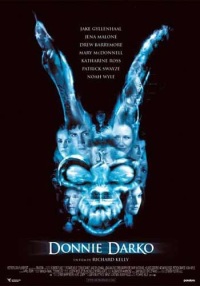 So we’ve dealt with opening shots and isolated shots, and now the House Next Door asks a different but related question:
So we’ve dealt with opening shots and isolated shots, and now the House Next Door asks a different but related question:
“What single movie image or moment do you think of more often than any other?”
The key phrase is “think of more often than any other.” This exercise isn’t about favorite, or canonical, moments or shots; it’s about after-the-fact individual response. (Please: Go and add your own.)
My answer comes from my iPod.
A song that shows up while shuffling through songs or on my “minor-key laments” playlist is so tied up in the ending of Richard Kelly’s Donnie Darko that it nearly brings me to tears every time.
Gary Jules’ “Mad World” – a cover of a Tears for Fears song – is almost a good track. Simple piano and cello set the mood and give appropriate room to Jules’ singing and the lyrics. But it’s overproduced, with some synthesizer and vocal processing botching the mood by introducing the artificial.
But independent of its quality as a song is the meaning and resonance it takes on as an essential part of Kelly’s movie. “Mad World” is an inspired match for Donnie Darko’s coda in both tone and content, and the song and movie are fused together, inseparable. (The pairing is even more natural than “Needle in the Hay” in The Royal Tenenbaums, and Kelly doesn’t mutilate the song the way Wes Anderson did Elliott Smith’s.)
In the context of the movie, “Mad World” gives voice to Donnie Darko’s complexities and contradictions, encompassing the convolutions of its plot and Donnie’s mixed emotions – the way he laughs when he knows he’s about to die, when he recognizes that he restored order to the universe. The song almost seems as if it were written specifically for the film:
“And I find it kind of funny /
I find it kind of sad /
The dreams in which I’m dying /
Are the best I’ve ever had.”
Yet “Mad World” is even more loaded. The singing is at once wistful and gently, confidently reassuring, and it helps the movie’s finale create a strange texture. The characters, of course, can’t know that Donnie sacrificed himself for them, yet their sadness at his passing is balanced by a subconscious understanding that, somehow, this is a better outcome than the alternative. Kelly, the performers, and the song together elegantly build this sense of knowledge within the characters without the requisite experience. Magical.
So, to answer the question posed by the House Next Door:
Whenever I hear “Mad World” – which is often – I see the face of devastated mother Mary McDonnell. It is not about the composition. It is about intense grief, leavened slightly by an unlikely hope.

